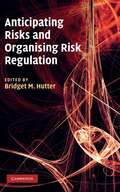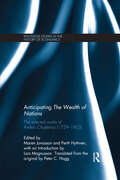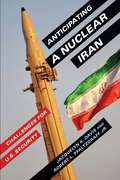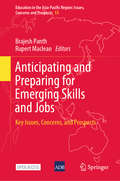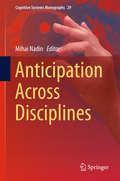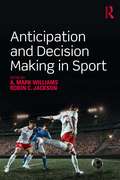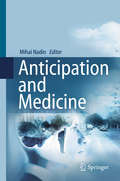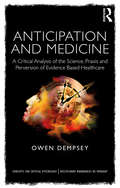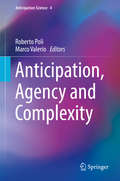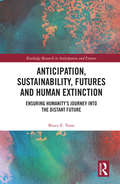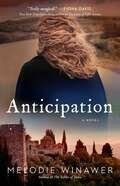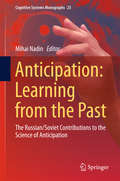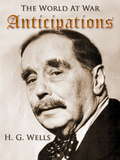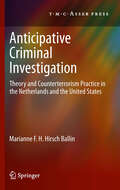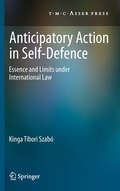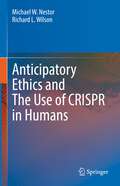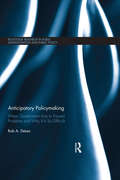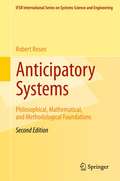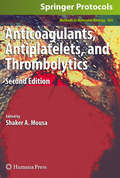- Table View
- List View
Anticipating Risks and Organising Risk Regulation
by Bridget M. HutterAnticipating risks has become an obsession of the early twenty-first century. Private and public sector organisations increasingly devote resources to risk prevention and contingency planning to manage risk events should they occur. This 2010 book shows how we can organise our social, organisational and regulatory policy systems to cope better with the array of local and transnational risks we regularly encounter. Contributors from a range of disciplines - including finance, history, law, management, political science, social psychology, sociology and disaster studies - consider threats, vulnerabilities and insecurities alongside social and organisational sources of resilience and security. These issues are introduced and discussed through a fascinating and diverse set of topics, including myxomatosis, the 2012 Olympic Games, gene therapy and the financial crisis. This is an important book for academics and policy makers who wish to understand the dilemmas generated in the anticipation and management of risks.
Anticipating The Wealth of Nations: The Selected Works of Anders Chydenius, 1729–1803 (Routledge Studies in the History of Economics #139)
by Anders ChydeniusThe book consists of eleven of the most important writings of Anders Chydenius, an eighteenth century pioneer of freedom and democracy. Thematically they touch upon subject areas such as the freedom of trade and industry, emigration, the monetary system of the Swedish realm in the eighteenth century, the freedom of the press (or as Chydenius said: the freedom of writing and printing), the freedom of information, the rights of the rural working class and the freedom of religion. The book also includes a comprehensive biography of Chydenius written by Lars Magnusson together with commentaries and explanatory notes to each text.
Anticipating a Nuclear Iran: Challenges for U.S. Security
by Jacquelyn Davis Robert Pfaltzgraff Jr.This volume is based on the assumption that Iran will soon obtain nuclear weapons, and Jacquelyn K. Davis and Robert L. Pfaltzgraff Jr. develop alternative models for assessing the challenges of a nuclear Iran for U.S. security. Through three scenario models, the book explores the political, strategic, and operational challenges facing the United States in a post–Cold War world. <P><P>The authors concentrate on the type of nuclear capability Iran might develop; the conditions under which Iran might resort to threatened or actual weapons use; the extent to which Iran's military strategy and declaratory policy might embolden Iran and its proxies to pursue more aggressive policies in the region and vis-à-vis the United States; and Iran's ability to transfer nuclear materials to others within and outside the region, possibly sparking a nuclear cascade. Drawing on recent post–Cold War deterrence theory, the authors consider Iran's nuclear ambitions as they relate to its foreign policy objectives, domestic politics, and role in the Islamic world, and they suggest specific approaches to improve U.S. defense and deterrence planning.
Anticipating and Preparing for Emerging Skills and Jobs: Key Issues, Concerns, and Prospects (Education in the Asia-Pacific Region: Issues, Concerns and Prospects #55)
by Rupert Maclean Brajesh PanthThis open access book analyzes the main drivers that are influencing the dramatic evolution of work in Asia and the Pacific and identifies the implications for education and training in the region. It also assesses how education and training philosophies, curricula, and pedagogy can be reshaped to produce workers with the skills required to meet the emerging demands of the Fourth Industrial Revolution.The book’s 40 articles cover a wide range of topics and reflect the diverse perspectives of the eminent policy makers, practitioners, and researchers who authored them. To maximize its potential impact, this Springer-Asian Development Bank co-publication has been made available as open access.
Anticipation
by Jennifer LabrecqueNO SEX FOR 30 DAYS!30 days and counting...When serial monogamist Nick O'Malley bets his buddies he can remain woman-free for 30 days, he figures he'll suffer, but succeed. Then a few curves are thrown his way....2 days and counting...One minute Nick's in his hotel room aching for the leggy blonde he left behind in the bar. The next, she's barging into his room--wearing nothing but a scrap of leather and thigh-high boots!1 night and counting...Nick might have fought Serena off once, but when she shows up the next night hell-bent on getting him out of his pants, he figures he'll be kissing his $500 goodbye. He'd almost think she had a hidden agenda--if he wasn't too busy fighting his lust. But he has to hold out, just for one more night. Even if it is the longest night of his life....
Anticipation Across Disciplines (Cognitive Systems Monographs #29)
by Mihai NadinNever before was anticipation more relevant to the life and activity of humankind than it is today. "It is no overstatement to suggest that humanity's future will be shaped by its capacity to anticipate. . . . " (Research Agenda for the 21st Century, National Science Foundation). The sciences and the humanities can no longer risk explaining away the complexity and interactivity that lie at the foundation of life and living. The perspective of the world that anticipation opens justifies the descriptor "the post-Cartesian Revolution. " If anticipation is a valid research domain, what practical relevance can we await? Indeed, anticipation is more than just the latest catch-word in marketing the apps developed by the digital technology industry. Due to spectacular advances in the study of the living, anticipation can claim a legitimate place in current investigations and applications in the sciences and the humanities. Biology, genetics, medicine, as well as politics and cognitive, behavioral, and social sciences, provide rich evidence of anticipatory processes at work. Readers seeking a foundation for an ticipation will find in these pages recent outcomes pertinent to plant life, political anticipation, cognitive science, architecture, computation. The authors contributing to this volume frame experimental data in language that can be shared among experts from all fields of endeavor. The major characteristic is the inference from the richness of data to principles and practical consequences.
Anticipation and Decision Making in Sport
by A. Mark Williams Robin C. JacksonThe ability to anticipate and make accurate decisions in a timely manner is fundamental to high-level performance in sport. This is the first book to identify the underlying science behind anticipation and decision making in sport, enhancing our scientific understanding of these phenomena and helping practitioners to develop interventions to facilitate the more rapid acquisition of the perceptual-cognitive skills that underpin these judgements. Adopting a multidisciplinary approach — encompassing research from psychology, biomechanics, neuroscience, physiology, computing science, and performance analysis — the book is divided into three sections. The first section provides a comprehensive analysis of the processes and mechanisms underpinning anticipation and skilled perception in sport. In the second section, the focus shifts towards exploring the science of decision making in sport. The final section is more applied, outlining how the key skills that impact on anticipation and decision making may be facilitated through various training interventions. With chapters written by leading experts from a vast range of countries and continents, no other book offers such a synthesis of the historical development of the field, contemporary research, and future areas for investigation in anticipation and decision making in sport. This is a fascinating and important text for students and researchers in sport psychology, skill acquisition, expert performance, motor learning, motor behaviour, and coaching science, as well as practicing coaches from any sport.
Anticipation and Medicine
by Mihai NadinIn this book, practicing physicians and experts in anticipation present arguments for a new understanding of medicine. Their contributions make it clear that medicine is the decisive test for anticipation. The reader is presented with a provocative hypothesis: If medicine will align itself with the anticipatory condition of life, it can prompt the most important revolution in our time. To this end, all stakeholders--medical practitioners, patients, scientists, and technology developers--will have to engage in the conversation. The book makes the case for the transition from expensive, and only marginally effective, reactive treatment through "spare parts" (joint replacements, organ transplants) and reliance on pharmaceuticals (antibiotics, opiates) to anticipation-informed healthcare. Readers will understand why the current premise of treating various behavioral conditions (attention deficit disorder, hyperactivity, schizophrenia) through drugs has to be re-evaluated from the perspective of anticipation. In the manner practiced today, medicine generates dependence and long-lasting damage to those it is paid to help. As we better understand the nature of the living, the proactive view of healthcare, within which the science and art of healing fuse, becomes a social and political mandate.
Anticipation and Medicine: A Critical Analysis of the Science, Praxis and Perversion of Evidence Based Healthcare (Concepts for Critical Psychology)
by Owen DempseyAnticipation in Medicine: A Critical Analysis of the Science, Praxis and Perversion of Evidence Based Healthcare looks at an aspect of healthcare rarely addressed: how the capitalist interest in diagnosis and treatment impacts upon the patient and, by extension, the system of healthcare itself. Using Lacanian structures of discourse, Dr. Owen Dempsey critiques the praxis of scientific Evidence Based Medicine (EBM) applied to anticipatory and preventive healthcare under capitalism and ultimately, what constitutes good care. This book features up-to-date case studies that combine real-life patients and the psychological impacts of anticipatory care such as cancer screening in the modern era. The book identifies the dangers of anticipatory care in medicine and provides compelling and new possibilities for progressing towards a more emancipatory conception of a less knowing, less apparently compassionate, as well as less harmful practice of health care. This is fascinating reading for academics, students and practitioners interested in critical health psychology, the practice of ‘scientific’ medicine, and the politics of health and social care.
Anticipation and Surprises in Central Bank Interest Rate Policy: The Case of the Bundesbank
by Daniel C. HardyA report from the International Monetary Fund.
Anticipation, Agency and Complexity (Anticipation Science #4)
by Roberto Poli Marco ValerioThis volume presents a selection of the Proceedings of the Workshop on Anticipation, Agency and Complexity held in Trento (Italy) on April 2017. The contributions contained in the book brilliantly revolve around three core concepts: agency, complexity and anticipation, giving precious insights to further define the discipline of anticipation. In a world that moves increasingly fast, constantly on the verge of disruptive events, more and more scholars and practitioners in any field feel in need of new approaches to make sense of the complexity and uncertainty that the future seems to bear. The theory of anticipation tries to describe how possible futures are intrinsically intertwined with the present.
Anticipation, Sustainability, Futures and Human Extinction: Ensuring Humanity’s Journey into The Distant Future (Routledge Research in Anticipation and Futures)
by Bruce E. TonnThis book considers the philosophical underpinnings, policy foundations, institutional innovations, and deep cultural changes needed to ensure that humanity has the best chance of surviving and flourishing into the very distant future. Anticipation of threats to the sustainability of human civilization needs to encompass time periods that span not just decades but millennia. All existential risks need to be jointly assessed, as opposed to addressing risks such as climate change and pandemics separately. Exploring the potential events that are likely to cause the biggest risks as well as asking why we should even desire to thrive into the distant future, this work looks at the ‘biggest picture possible’ in order to argue that futures-oriented decision-making ought to be a permanent aspect of human society and futures-oriented policy making must take precedent over the day-to-day policy making of current generations in times of great peril. The book concludes with a discourse on the truly fundamental bottom-up changes needed in our personal psychologies and culture to support these top-down recommendations. This book is of great interest to philosophers, policy analysts, political scientists, economists, psychologists, planners, and theologians.
Anticipation: A Novel
by Melodie WinawerFrom the author of the &“engrossing historical epic&” (Booklist) The Scribe of Siena comes a thrilling tale set in the crumbling city of Mystras, Greece, in which a scientist&’s vacation with her young son quickly turns into a fight for their lives after they cross paths with a man out of time.After the death of her beloved husband and becoming a single parent to her nine-year-old son Alexander, overworked scientist Helen desperately needs an escape. So when Alexander proposes a trip to Greece—somewhere he's always dreamed of visiting—Helen quickly agrees. After spending several days exploring the tourist-filled streets, they stumble upon the ancient city of Mystras and are instantly drawn to it. Its only resident is Elias, a mysterious tour guide living on the city&’s edges…both physically and temporally. In 1237, Elias&’s mother promised his eternal service to the Profitis Ilias in Mystras in exchange for surviving a terrible illness. But during his 800 years of labor, he&’s had one common enemy: the noble Lusignan family. The Lusignan line is cursed by a deadly disease that worsens with each generation, and a prophecy hints that Elias&’s blood is their only hope for a cure. He has managed to survive throughout the centuries, but the line has dwindled down to the last Lusignan and he is desperate to avert his family&’s destiny. When Elias runs into Helen, he meets his match for the first time—but he unwittingly puts both her and her young son in danger as a result. With time running out and an enemy after them, Elias and Helen are forced to choose between the city they love, and each other. Blending the historical romance of Diana Gabaldon, the rich detail of Philippa Gregory&’s novels, and Dan Brown&’s fast-paced suspense, Anticipation is a thrilling and satisfying read like no other.
Anticipation: The Russian/Soviet Contributions to the Science of Anticipation (Cognitive Systems Monographs #25)
by Mihai NadinThis volume presents the work of leading scientists from Russia, Georgia, Estonia, Lithuania, Israel and the USA, revealing major insights long unknown to the scientific community. Without any doubt their work will provide a springboard for further research in anticipation. Until recently, Robert Rosen (Anticipatory Systems) and Mihai Nadin (MIND - Anticipation and Chaos) were deemed forerunners in this still new knowledge domain. The distinguished neurobiologist, Steven Rose, pointed to the fact that Soviet neuropsychological theories have not on the whole been well received by Western science. These earlier insights as presented in this volume make an important contribution to the foundation of the science of anticipation. It is shown that the daring hypotheses and rich experimental evidence produced by Bernstein, Beritashvili, Ukhtomsky, Anokhin and Uznadze, among others--extend foundational work to aspects of neuroscience, physiology, motorics, education.
Anticipations: Of The Reaction Of Mechanical And Scientific Progress Upon Human Life And Thought (The World At War)
by H. G. WellsIn 1901, the great writer and social critic attempted to predict the future in this book, a fascinating mix of accurate forecasts — development of cars, buses and trucks, use of flying machines in combat, decline of permanent marriage — and wild misses, including the prediction that submarines will suffocate their crews and founder at sea. Anticipations of the Reaction of Mechanical and Scientific Progress upon Human Life and Thought, generally known as Anticipations, was written by H.G. Wells at the age of 34. He later called the book, which became a bestseller, "the keystone to the main arch of my work." (Excerpt from Goodreads)
Anticipative Criminal Investigation: Theory and Counterterrorism Practice in the Netherlands and the United States
by Marianne F.H. Hirsch BallinThe book assesses the adoption of counterterrorism measures in the Netherlands and the United States, which facilitate criminal investigations with a preventive focus (anticipative criminal investigations), from the perspective of rule of law principles. Anticipative criminal investigation has emerged in the legal systems of the Netherlands and the United States as a consequence of counterterrorism approaches where the objective of realizing terrorism prevention is combined with the objective to eventually prosecute and punish terrorists. This book has addressed this new preventive function of criminal justice and identified the rule of law principles limiting the role of criminal investigation in terrorism prevention. The possibilities and limits of criminal investigation in general and of cooperation and the division of responsibilities between law enforcement and intelligence have been addressed in a manner transcending differences between national legal systems. Valuable for academics and practitioners interested in criminal investigation, rule of law and counterterrorism.
Anticipatory Action in Self-Defence: Essence and Limits under International Law
by Kinga Tibori SzabóThe legality of preemptive strikes is one of the most controversial questions of contemporary international law. At the core of this controversy stands the temporal dimension of self-defence: when and for how long can a state defend itself against an armed attack? Can it resort to armed force before such an attack occurs? Is anticipatory action covered by the rules of self-defence or should it be treated as a different concept? This book examines whether anticipatory action in self-defence is part of customary international law and, if so, under what conditions. The pre-Charter concept of anticipatory action is demarcated and then assessed against post-Charter state practice. Several instances of self-defence - both anticipatory and remedial - are examined to elucidate the rules governing the temporal dimension of the right. The Six-Day War (1967), the Israeli bombing of an Iraqi reactor (1981), the US invasion of Iraq (2003) and other instances of state practice are given thorough attention.
Anticipatory Ethics and The Use of CRISPR in Humans
by Michael W. Nestor Richard L. WilsonThe future of gene editing in humans will involve the use of CRISPR. How we think about the combination of the scientific, ethical, and moral aspects of this technology is paramount to the success or failure of CRISPR in humans. Unfortunately, the current scientific discussion around CRISPR in humans has left ethics trailing behind due to the rapid pace of innovation. New modes of ethics and stakeholder participation are needed to keep pace with rapid scientific advances and provide the necessary policy and ethical frameworks necessary to help CRISPR flourish as an important health care tool to treat human disease. This requires intense interdisciplinary collaboration and discussion between scientists and philosophers, policymakers and legal scholars, and the public.Dr. Michael W. Nestor (a neuroscientist who actively uses CRISPR in pre-clinical research) and Professor Richard Wilson (a philosopher who focuses on anticipatory ethics) set out to develop a new ethical approach considering the use of CRISPR in human targeted therapies. The field of anticipatory ethics is uniquely poised to tackle questions in fast-evolving technical areas where the pace of innovation outstrips traditional philosophical approaches. Furthermore, because of its “anticipatory” nature, this type of analysis provides the opportunity to look ahead and into the future concerning potential uses of CRISPR in humans, uses that are not currently possible. Nestor and Wilson collaborate both scientifically and philosophically in this book to forecast potential outcomes as the scientific and medical community goes beyond using CRISPR to correct genes that underlie diseases where a single gene is involved. Instead, Nestor and Wilson envision CRISPR in complex, multigenic disorders with a specific focus on the use of CRISPR to edit genes involved in mental traits like IQ or other cognitive characteristics. They argue that the use of CRISPR to modify genes that are potentially important for mental traits represents a particular category for special consideration from scientists, policymakers, the public, and other stakeholders. Nestor and Wilson explain why using CRISPR to alter mental states is very different from treating a disease like cancer by combining the latest scientific advancements with anticipatory ethics and philosophical phenomenology. Their analysis considers the role that mental states play in personhood and the lived experience-as genes that can change mental/cognitive attributes like IQ have wide-ranging effects on the lived experience in ways that are categorically different from other attributes. This book was written to set a non-exhaustive framework for shared understanding and discussion across disciplines and appeal to scientists and non-scientists alike. This appeal is made inclusively, inviting all stakeholders to engage in active dialogue about the appropriate context for using CRISPR and other gene-editing technologies in humans. It provides policy analysis and recommendations for assuring the most inclusive, equitable, and ethically sound use of CRISPR in humans, concerning its positive potential to treat mental conditions like depression, schizophrenia, Alzheimer’s disease, autism, and the potential to induce other cognitive enhancements.
Anticipatory Materialisms in Literature and Philosophy, 1790–1930
by Jo Carruthers Nour Dakkak Rebecca SpenceAnticipatory Materialisms explores nineteenth and early twentieth-century literature thatanticipates and pre-empts the recent philosophical ‘turn’ to materiality and affect. Critical volumes that approach literature via the prism of New Materialism are in the ascendence. This collection stakes a different claim: by engaging with neglected theories of materiality in literary and philosophical works that antedate the twenty-first century ‘turn’ to New Materialism and theories of affect, the project aims to establish a dialogue between recent theoretical considerations of people-world relations in literature and that which has gone before. This project seeks to demonstrate the particular and meaningful ways in which interactions between people and the physical world were being considered in literature between the nineteenth and early twentieth centuries. The project does not propose an air of finality; indeed, it is our hope that offering provocative and challenging chapters, which approach the subject from various critical and thematic perspectives, the collection will establish a broader dialogue regarding the ways in philosophy and literature have intersected and informed each other over the course of the long nineteenth century.
Anticipatory Policymaking: When Government Acts to Prevent Problems and Why It Is So Difficult (Routledge Research in Public Administration and Public Policy)
by Rob A. DeLeoPublic policy analysts and political pundits alike tend to describe the policymaking process as a reactive sequence in which government develops solutions for clearly evident and identifiable problems. While this depiction holds true in many cases, it fails to account for instances in which public policy is enacted in anticipation of a potential future problem. Whereas traditional policy concerns manifest themselves through ongoing harms, "anticipatory problems" are projected to occur sometime in the future, and it is the prospect of their potentially catastrophic impact that generates intense speculation and concern in the present. Anticipatory Policymaking: When Government Acts to Prevent Problems and Why It Is So Difficult provides an in depth examination of the complex process through which United States government institutions anticipate emerging threats. Using contemporary debates over the risks associated with nanotechnology, pandemic influenza, and global warming as case study material, Rob A. DeLeo highlights the distinctive features of proactive governance. By challenging the pervasive assumption of reactive policymaking, DeLeo provides a dynamic approach for conceptualizing the political dimensions of anticipatory policy change.
Anticipatory Systems: Philosophical, Mathematical, and Methodological Foundations (IFSR International Series in Systems Science and Systems Engineering #1)
by Robert RosenRobert Rosen was not only a biologist, he was also a brilliant mathematician whose extraordinary contributions to theoretical biology were tremendous. Founding, with this book, the area of Anticipatory Systems Theory is a remarkable outcome of his work in theoretical biology. This second edition of his book Anticipatory Systems, has been carefully revised and edited, and includes an Introduction by Judith Rosen. It has also been expanded with a set of Prolegomena by Dr. Mihai Nadin, who offers an historical survey of this fast growing field since the original work was published. There is also some exciting new work, in the form of an additional chapter on the Ontology of Anticipation, by Dr. John Kineman. An addendum-- with autobiographical reminiscences by Robert Rosen, himself, and a short story by Judith Rosen about her father-- adds a personal touch. This work, now available again, serves as the guiding foundations for the growing field of Anticipatory Systems and, indeed, any area of science that deals with living organisms in some way, including the study of Life and Mind. It will also be of interest to graduate students and researchers in the field of Systems Science.
Anticlimax: A Feminist Perspective on the Sexual Revolution
by Sheila JeffreysSexuality has been reframed by postmoderism, but this clear discussion of literature, politics, and popular culture provides a useful historical view. The sexual revolution of the 1960s and 1970s is remembered as a time of great freedom for women, but did the sexual revolution have the same goals as the Women's Liberation Movement? Was it truly liberation for women or just another insidious form of oppression? This provocative book argues that sexual freedom sometimes directly opposed actual freedom for women. Tracing sexual mores and attitudes from the 1950s through the 1990s, it explores the nature of both straight and gay relationships and offers original and compelling commentary on The Joy of Sex, Lolita, Naked Lunch, and other representations in the literature on sexuality. Newly updated, this edition provides an important critique and insight into these controversial issues.
Anticoagulant Rodenticides and Wildlife (Emerging Topics in Ecotoxicology #5)
by John E. Elliott Nico W. van den Brink Richard F. Shore Barnett A. RattnerCommensal rodents pose health risks and cause substantial damage to property and food supplies. Rats have also invaded islands and pose a serious threat to native wildlife, particularly raptors and seabirds. Estimates of total damage from introduced rats range into the billions of dollars in developed countries. This book aims to provide a state-of-the-art overview of the scientific advancements in the assessment of exposure, effects and risks that currently used rodenticides may pose to non-target organisms in the environment, along with practical guidance for characterization of hazards. This will be discussed in relation to their efficacy, and the societal needs for rodent control, and discussion of risk mitigation and development of alternatives. The flow in the book is planned as: a. introduction and setting the scene b. problem description (risks and effects on non-targets and secondary poisoning, development of resistance) c. ; alternatives, regulation and risk mitigation d. conclusions and recommendations
Anticoagulants, Antiplatelets, and Thrombolytics, 2nd Edition: Methods And Protocols (Methods in Molecular Biology #663)
by Shaker A. MousaDuring the past decade, remarkable progress has been made in the development of newer drugs to prevent and treat thromboembolic disorders, such as oral direct anti-Xa and anti-IIa antagonists, as well as oral antiplatelet ADP antagonists with rapid onset and offset. In addition, there has been concentrated effort aimed at identifying novel uses of traditional antithrombotic drugs, such as aspirin, heparin, and oral anticoagulants, as well as combinations of agents, such as more than one antiplatelet, antiplatelet with anticoagulant, antiplatelet with or without thrombolytic. Anticoagulants, Antiplatelets, and Thrombolytics, Second Edition provides updates on various strategies in thrombosis, experimental models, and clinical and recent advances in the discovery and development of novel antithrombotics. As a volume in the highly successful Methods in Molecular BiologyTM series, this collection provides the kind of detailed description and implementation advice that is crucial for getting optimal results. Easy to use and up to date, Anticoagulants, Antiplatelets, and Thrombolytics, Second Edition is an ideal guide for researchers aiming for the future of this vital field, focusing on the prevention of thromboembolic disorders and the protection of the vascular endothelium.
Anticoagulants, Antiplatelets, and Thrombolytics: Methods And Protocols (Methods in Molecular Medicine #93)
by Shaker A. Mousa1This collection of review articles highlights the latest development of antithrombotics and provides proven experimental methods for the further development of new and improved anticoagulants. Among the cutting-edge developments reviewed are the novel usage of low molecular weight heparins, such antithrombin agents as the hirudin, and such antiplatelet drugs as the GPIIb/IIIa inhibitors and ADP receptor antagonists. Additional innovations discussed include aspirin and clopidogrel, the expanded use of polytherapeutic approaches, antiproteases (factors IIa, Xa, and VIIa), tissue factor targeting, platelet receptor targeting, and antithrombin III modulation.
